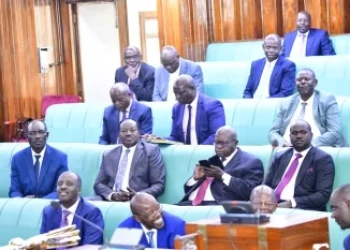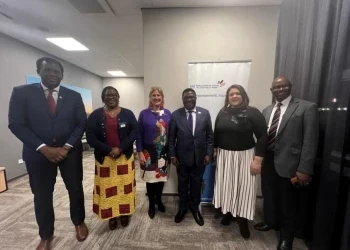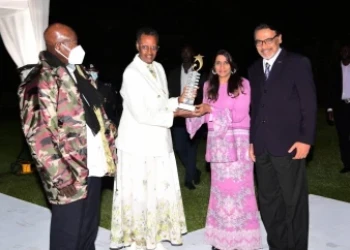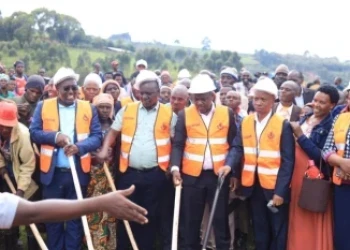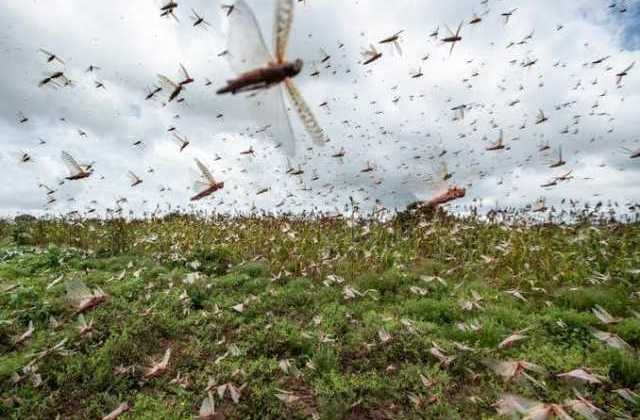
The ministry of agriculture, animal industry and fisheries is still grappling with a Desert Locust Invasion in Uganda which started in early February and is now in 24 districts that include: Amudat, Nakapiripirit, Nabilatuk, Moroto, Kotido, Kaabong, Karenga, Abim, Otuke, Napak, Katakwi, Amuria, Soroti, Ngora, Kumi, Bukedea, Bukwo, Kween, Agago, Kitgum, Lamwo, Pader among others, despite control efforts on the ground.
On 29th February, 2020, one swarm crossing from Kenya was reported at Lorengedwat in Nabilatuk and settled at Matany in Napak; covering nearly 10 sq/km. Two other swarms have been reported in Rupa, Moroto and Kakamongole in Nakapiripirit district.
Hon. Vincent Bamulangaki Ssempija the Minister of Agriculture, animal industry and fisheries says that in response to the invasion, a number of interventions continue to be undertaken by Government in collaboration with relevant stakeholders to minimize the impact of desert Locusts on food security and livelihoods of communities in the affected Districts.
Now, MAAIF technical team with support of a National Consultant and in collaboration with experts from Desert Locust Control Organization for Eastern Africa (DLCOEA); Food and Agriculture Organization of the United Nations; and the National Agriculture Research Organization (NARO) are on the ground in the affected District Local Governments training extension workers, District leaders and other stakeholders on the management of Desert Locusts.
The same teams have also trained the UPDF and staff of the Uganda Wildlife Authority on safe use and handling of the pesticide’s equipment. Government has also dispatched an assortment of pesticides, spray pumps (motorized and knapsack) and protective gear to the affected District Local Governments and ground control operations have been conducted in all the 24 Districts, to minimize the spread of the mature egg laying desert Locusts.
Surveillance and monitoring teams from MAAIF and trained staff from District Local Governments and Uganda People’s Defense Forces have continued to assess and map out areas where eggs could have been laid by the Locusts and maps are being developed to guide the control as the eggs hatch into nymphs (both by aerial and ground control)
Ground spraying of Desert Locusts has continued in the affected districts by UPDF. The responses are based on information provided by the trained surveillance team that provides coordinates of the areas where swarms will have roosted for the night. The ground spraying has been successful in suppressing the mature Desert Locust swarms thus cutting off the laying of eggs that would have resulted into a bigger population of locusts.
Also, an aircraft from the Desert Locust Control Operational Base was deployed in Moroto - Karamoja subregion to conduct transboundary aerial spraying/control to suppress the potential of invading swarms from Turkana area into the Country.
“Aerial spraying using the deployed DLCOEA aircraft using Fenitrothion 96 ULV was conducted at Napeto, Nakachumti Parish Matany Sub-county Napak disrtict on 1st March, 2020. On the 2nd March 2020, more aerial spraying of desert locusts was conducted at kadonyo, Tapac subcounty Moroto district. More areas for aerial spraying are being assessed and mapped. 2.5.2. The second aircraft is awaiting the delivery of more aerial spray pesticide (ULV) from Japan and Nairobi to be deployed in the field and this should happen anytime from now” the Minister said.
The Minister further advises members of the Public to not eat the dead locusts as they will have been sprayed and would be poisonous to ingest and report any sightings of the Desert Locusts to the nearest agricultural extension officer, local Council leaders and call on 0800177777.
Comments (0)
📌 By commenting, you agree to follow these rules. Let’s keep HowweBiz a safe and vibrant place for music lovers!



